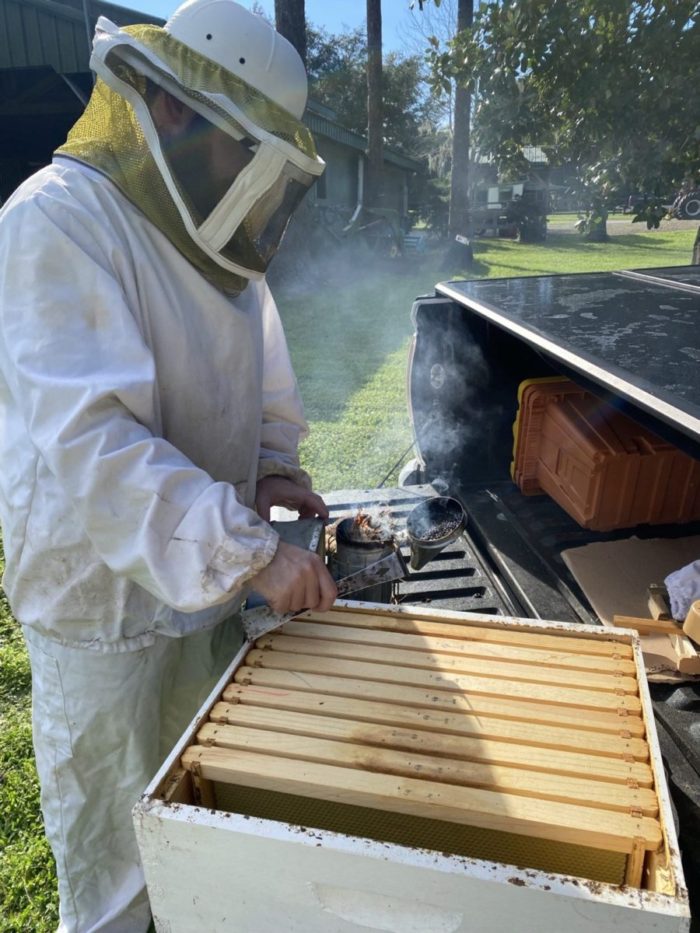The global pandemic and an unexpected layoff from a great local law firm set Spencer Evans on a beeline to a new career.
He is still young – only 27 – and he will likely continue to practice law for years to come. But his passion is for the birds… and the butterflies and the farm crops that feed the masses, all via the honeybee.
“I was already doing beekeeping for funnzies and I got a remote position with a firm that does corporate discovery work,” said Evans, a Stetson Law School graduate who grew up on a small farm in Deland. “I could do it on my couch and the hours are flexible, so it gave me more time to focus on other things.” Like beekeeping.
And so it was that the Barefoot Beekeeping Co. took flight. Evans hopes it will eventually become a sweet career that will allow him to hang up his attorney suit.
“It was a typical attorney thing, starting out with research, research research,” he said. “I reached out to a bunch of different beekeepers, especially those already doing these high-posting programs, begging them to meet with me for an hour or two, then hammering them with questions.”
Most beekeepers make money by traveling with their bees to various agricultural fields where the bees pollinate the crops. “But others, one guy in Seattle, his big clients are like Google,” Evans said. “There is a new movement which is pretty cool across the country where corporations are using mega complexes to host beehives on their rooftops. It shows that they are committed to more than just being another corporate overlord.”
Evans started the business doing beehive removal, a skill he acquired through the University of Florida’s Master Beekeeper program. He now hopes to expand, creating hives in urban areas throughout the Tampa Bay region.
For anyone wishing to host a beehive, the starting cost is $500. Clients will also pay a monthly fee for Evans to cover his mileage, time, medications needed to care for the bees and the equipment he uses.
Honeybees are facing a global decline, largely due to intensive farming practices that use pesticides, mono-cropping, high temperatures associated with climate change, pollution and the loss of biodiversity.
FAO, the Food and Agriculture Organization of the United Nations, leads international efforts to defeat hunger. It encourages pollinator-friendly practices in agriculture to ensure pollination, which is critical to food production. Bees and other pollinators, including birds and bats, affect 35% of the world’s food crops. So, anyone who is helping to expand honeybee populations is part of this effort.
Evans hopes to spread his beehives throughout the region. It will help people to maintain their environmentally conscious attitudes and it will help save the bees, he said.
“So far, I’ve had interest from several community gardens and one very big client that I am meeting with next week that hopefully I will be announcing.” Yes, he admitted, it is a corporate client, but all other details are mum for now.
“I’m still just trying to come up with all the details and getting the word out before I start pushing, in earnest, to give myself plenty of time to get all of my ducks in a row.”
Evans is shooting for spring to get the business on more solid footing. “Normally, you build new hives in the spring, depending on how cold a winter we have,” he said. “You take a few frames of honey and brood and separate them into what is called a nucleus box and either give them a queen or allow them to raise a queen.”
All but a few of the bees in a hive are female. The few males are called drones and they are responsible for creating the new queen. “They are fat little bees, and their life is interesting,” Evans said. “They eat honey and wait around to have sex. Splits are a way to naturally propagate the bee population.”
There is a community apiary near Great Bay Distributors on Gandy Boulevard where Evans keeps his bees for now. It supports 50 or 60 hives. Evans said he has learned even more from other beekeepers who use the apiary. “It’s very much a hands-on learning process and you are going to do things wrong and hurt your bees, but every time, you learn more.”
Anyone, individual or business, interested in hosting a hive can contact Evans through email at spencer@barefootbeekeepingco.com, or call him at 386-785-7859.




























